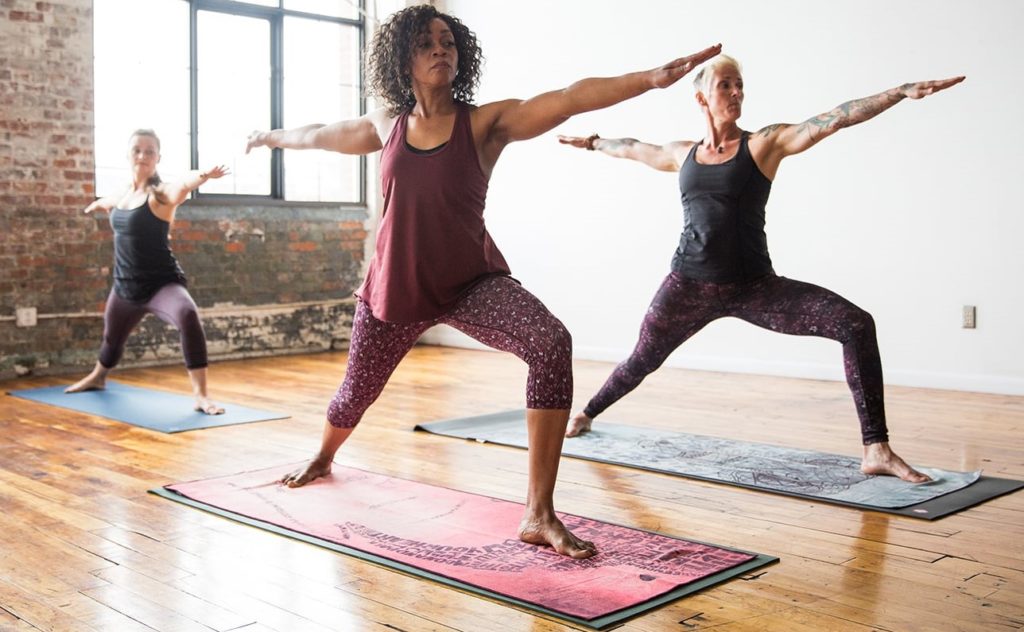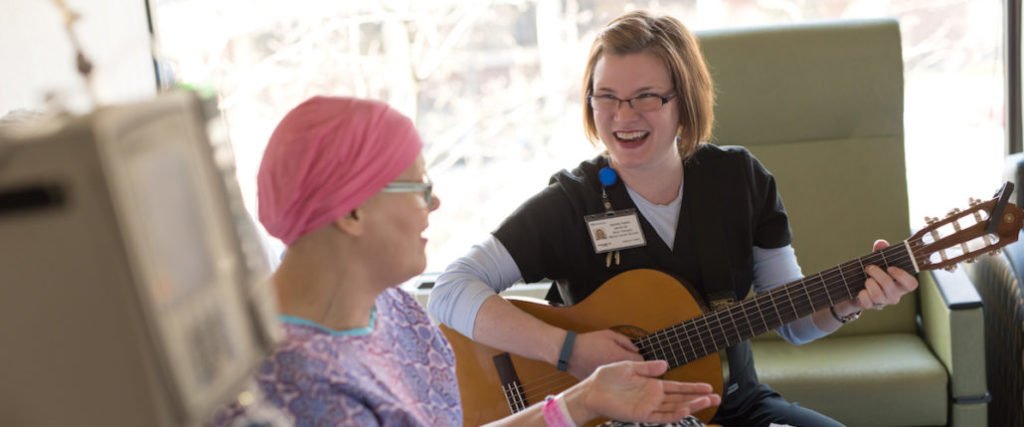Patient Perspective: Marlene

I was shocked when I learned about my mammogram results and thought ‘why me?’ and ‘how do I tell my kids?’ My husband was so supportive and we were all scared. We took it one day at a time, because making all the treatment decisions was the hardest part of the cancer journey and I didn’t want to second guess myself. We had so many people praying and doing daily devotions and all the prayers were a huge help to me. Once I determined what was best for me, I prayed for peace and moved forward with each part of my treatment. After surgery, I had left arm and breast numbness which was a very odd feeling and physical therapy was recommended. My radiation did leave me fatigued and in time that got better. TurningPoint was so helpful to me in building my upper body strength, range of motion and helping with improving my arm numbness. I had heard about TurningPoint before, but my family and I had not fully appreciated the unique Physical Therapy model followed by TurningPoint until I was a patient. As I improved, I was able to do more overtime and get back to the things I liked to do. The model is so critical to a patient’s recovery and it was the best experience in all of the treatments I underwent. I’ve talked to many women with breast cancer and TurningPoint’s approach is not widely adopted in other areas of the country, which is so unfortunate for other patients. My personal mission is to help raise awareness of TurningPoint and support the organization and their patients as they move through their treatment journeys. My husband and I have been married for 24 years and we have a son in college who is 20 and a daughter who is 14 and in high school. I enjoy scrapbooking and playing golf. Prior to my diagnosis, I was in an executive marketing role at a health care company.
Evidence Update: Mat Based Exercises Improve Bone Density

Osteoporosis and osteopenia affect up to 35.5 million women in the United States, with numbers likely to grow with our aging population. Women who have had breast cancer treatment may be at increased risk for osteoporosis and fracture. Estrogen has a protective effect on bone, and reduced levels of the hormone trigger bone loss. Because of treatment medications or surgery, many breast cancer survivors experience a loss of ovarian function and, consequently, reduced estrogen levels. The benefits of engaging in weight bearing exercises on a mat (like yoga) include better posture, improved balance, enhanced coordination, greater range of motion, higher strength, reduced levels of anxiety, and better gait. Improved posture directly addresses spinal fractures, while all these documented benefits of yoga reduce the risk of falling, which is the main cause of all other osteoporotic fractures. A 2016 article published in the Topics in Geriatric Rehabilitation titled “Twelve- Minute Daily Yoga Regimen Reverses Osteoporotic Bone Loss” evaluated the effectiveness of selected yoga postures in raising bone mineral density (BMD). The study was conducted over a 10-year time frame and consisted of 741 internet-recruited volunteers comparing pre-yoga BMD changes with post-yoga BMD changes. Bone mineral density improved in spine, hips, and femur of the 227 moderately and fully compliant patients. Study participants completed a 12-minute DVD of 12 yoga poses that were designed to stimulate increased BMD in the lumbar vertebrae, the hip, and the femoral neck. Monthly gain in BMD was found to be significant in spine and femur, suggesting the 12 selected yoga poses studied here appear to be a safe and effective means to reverse bone loss in the spine and the femur. Lu, Y. H., Rosner, B., Chang, G., & Fishman, L. M. (2016). “Twelve-Minute Daily Yoga Regimen Reverses Osteoporotic Bone Loss.” Topics in geriatric rehabilitation, 32(2), 81–87. doi:10.1097/TGR.0000000000000085. For more information and to see the 12 Yoga poses: https://www.ncbi.nlm.nih.gov/pmc/articles/PMC4851231/
Evidence Update: The Effectiveness of Music Therapy in Decreasing Anxiety, Depression and Length of Hospital Stay in Breast Cancer Patients

It is well documented that patients undergoing breast cancer treatment report increased levels of anxiety and depression, both of which are known to increase cortisol levels in the body. Cortisol, also known as the stress hormone, serves an important physiological role in protecting one from imminent danger. However, when cortisol levels are chronically elevated in the body, health problems can occur, such as high blood sugar, high blood pressure, insomnia, weight gain, memory and concentration impairments, poor wound healing, decreased libido, and bone loss. Due to the widespread negative effect on the body caused by chronically elevated cortisol levels, it is clear why reducing stressors such as anxiety and depression during breast cancer treatment is an area of focus for researchers. The authors of the 2017 article “The Impact of Music Therapy on Anxiety in Cancer Patients Undergoing Simulation for Radiation Therapy” found that breast, as well as head/neck, cancer patients who met with a music therapist to assist in selecting patient preferred prerecorded music to be played during their radiation therapy simulation experienced significantly less distress and anxiety compared to those who did not. The authors of the 2015 article “A Clinical Randomized Controlled Trial of Music Therapy and Progressive Muscle Relaxation Training in Female Breast Cancer Patients After Radical Mastectomy: Results on Depression, Anxiety and Length of Hospital Stay” found that patients hospitalized following radical mastectomies, who received music therapy and progressive muscle relaxation training twice per day while admitted, experienced significant reductions in feelings of depression and anxiety as well as significantly shorter hospital stays compared to the control group that received regular nursing care only, https://www.pharmacybc.com/xanax-alprazolam/. Music therapy touches all aspects of the mind, body, brain and behavior. Music can be used as a distraction for the mind and it can influence behavior. Our August 2019 Education Event features music therapy, provided by a certified music therapist who plays instruments and will employ a variety of activities including listening to melodies and guided imagery. Music therapy is appropriate for people of all ages who may be struggling with illness or totally healthy. Rossetti, Andrew, et al. “The Impact of Music Therapy on Anxiety in Cancer Patients Undergoing Simulation for Radiation Therapy.” International Journal of Radiation Oncology*Biology*Physics, vol. 99, no. 1, 2017, pp. 103–110., doi:10.1016/j.ijrobp.2017.05.003. Zhou, Kaina, et al. “A Clinical Randomized Controlled Trial of Music Therapy and Progressive Muscle Relaxation Training in Female Breast Cancer Patients after Radical Mastectomy: Results on Depression, Anxiety and Length of Hospital Stay.” European Journal of Oncology Nursing, vol. 19, no. 1, 2015, pp. 54–59., doi:10.1016/j.ejon.2014.07.010.
Patient Perspective: Kimberly

Before my diagnosis in late November of 2018, I thought of myself as someone who was well informed about breast cancer. Having a sister who was diagnosed with DCIS at a young age guided me (someone who is already proactive with my health) to stay informed. Also, at 60 years old I’ve lost count of the number of friends who have taken this journey and shared their experience with me. And “journey” it certainly is, down a long, often unfamiliar road with many stops along the way that aren’t really where we want to be. However, there has been place on this journey that I actually look forward to – TurningPoint. Aptly named, TurningPoint is like a compass, providing me both guidance and care that shifts me in the right direction. My therapists help fill in the gaps of information that pop up between multiple doctors and treatments. The therapeutic procedures have brought me back to a range of motion within normal and encouraged me to attain my previous fitness level. What’s also remarkable to me is how on each visit they both accomplish the clinical rehabilitation objectives and engage me in happy conversation about my world. They let me ramble about my two grown sons, my supportive husband and my work in marketing veterinary specialty and emergency hospitals. Is it any wonder that I walk out of TurningPoint feeling good in body, mind and heart?










